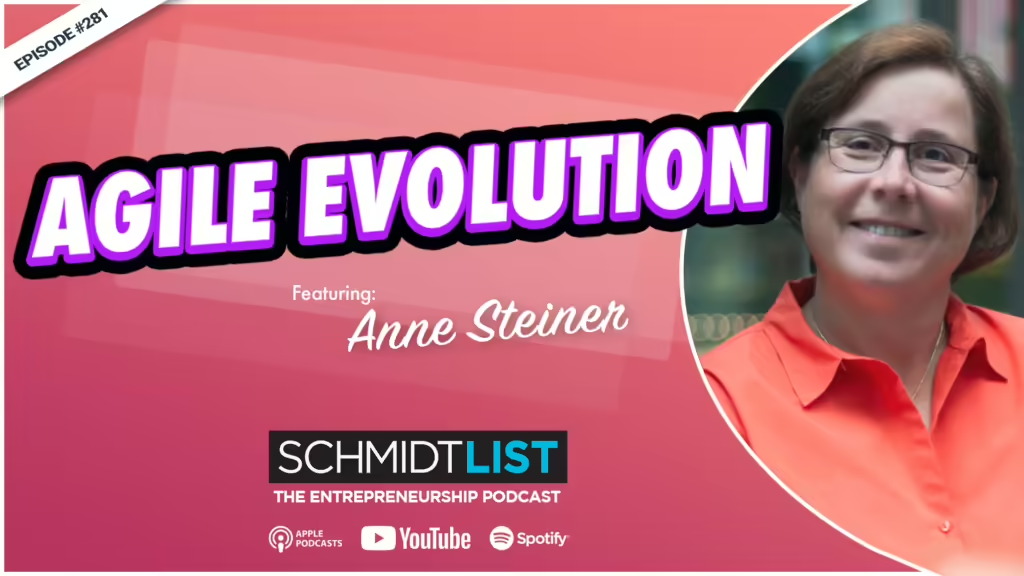Diving Deep into Product Management, Agile Methodology, and Leadership Post-Pandemic
Welcome to another exciting episode of the Schmidt List podcast. Our host, Kurt Schmidt, engaged in an insightful conversation with strategic advisor Anne Steiner from NerdNoir. This time, they unpacked a treasure trove of topics, from the nuances of product management to the evolving dynamics of agile methodologies and the ripple effects of the pandemic on leadership and team collaboration.
The Power of Learning from Mistakes
In innovation, mistakes aren’t just inevitable—they’re invaluable. Kurt Schmidt and Anne Steiner delved into learning from others’ experiences, often highlighted by a memorable sign from Steiner’s early job: “Learn from others’ mistakes.” Both agreed that a culture where mistakes are celebrated can catalyze innovation and growth.
Schmidt emphasized that the energy derived from community interactions can’t be replicated through mere book learning or following influencers. It’s the first-hand exchanges and real-world experiences that provide deeper insights.
Agile Methodology Post-Pandemic: A Reality Check
Before the pandemic, agile methodologies were all the rage. However, the post-pandemic world painted a different picture. As Steiner pointed out, the enthusiasm around agile has simmered, not due to COVID-19 directly but because many industries have matured in their adoption. Sectors like finance and pharma have leaned towards more structured approaches, such as the Scaled Agile Framework (SaI), to meet their needs.
Interestingly, this shift signals an evolution rather than a retreat. Agile processes have become a foundational rather than a forefront topic, with organizations now focused on product management and driving technological advancements to stay competitive.
The Unstandardized Role of Product Managers
One pressing issue that Schmidt and Steiner highlighted is the lack of standardization in the role of product managers across industries. Unlike project managers, whose roles and career paths are well-defined, product managers often wear multiple hats, creating a broad spectrum of responsibilities and frequently inadequate career development paths.
Steiner and Schmidt suggested building full-stack product teams instead of relying solely on a “full-stack product manager,” which could help streamline and improve the efficiency of product management within organizations.
Organizational Structure and the Call for Team-Based Goals
Another significant topic of discussion was the misalignment of incentives within organizations. Steiner illustrated this point with an example from a financial services company where disconnects between product management and engineering led to operational inefficiencies.
To bridge this gap, Steiner suggested implementing team-based goals that align with overarching product objectives rather than sticking to individual incentives. This approach could foster a more cohesive working environment and improve performance across all roles.
The Pandemic’s Impact on Leadership and Collaboration
Steiner shared her observations on how the pandemic has reshaped collaboration dynamics. While principles of product development remain unchanged, remote working has thrown a wrench into the social interactions at work that traditionally facilitated relationship-building and collaboration.
Schmidt and Steiner discussed the increased frequency of meetings post-pandemic, which has somewhat constrained leadership flexibility. The challenges posed by asynchronous communication and virtual settings often lead to misinterpretations and stress.
Both agree that reconnecting with teams and clients is crucial for mitigating these issues. Steiner’s inventive methods for maintaining casual client meetings serve as a practical approach to fostering those vital connections.
Networking: The Lifeline for Founders and Innovators
Networking emerged as another focal point in the conversation. Schmidt and Steiner discussed how meeting other leaders and engaging with different perspectives can offer immense support, especially for small company founders struggling with isolation.
Steiner underscored that rapid prototyping, market validation, and networking opportunities provided by incubators and startup weeks are invaluable resources for anyone looking to innovate and grow.
Authenticity in Innovation: Beyond the Buzzwords
Wrapping up, Steiner emphasized that innovation doesn’t always need to be groundbreaking. Addressing existing challenges with creative solutions can be equally innovative. Both Schmidt and Steiner noted that companies driven by goals beyond monetary gain tend to sustain longer, using customer engagement and retention as leading indicators of success.
In essence, anchoring decisions in customer feedback and continually striving for correctness in those decisions sets the foundation for true innovation.
—
This enlightening conversation between Kurt Schmidt and Anne Steiner offers a wealth of knowledge. It underscores the transformational potential of addressing mistakes, redefining roles, and fostering genuine human connections in today’s ever-evolving work environment. Whether you’re a budding entrepreneur or a seasoned leader, these insights could be the key to unlocking new pathways to success.
For more wisdom, visit http://nerdnoir.com or connect with Anne Steiner on LinkedIn.
